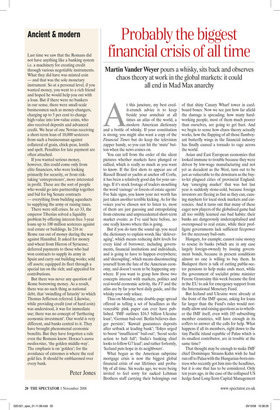Ancient & modern
Last time we saw that the Romans did not have anything like a banking system i.e. a machinery for creating credit through various negotiable instruments. What they did have was minted coin — and that was the sole monetary instrument. So at a personal level, if you wanted money, you went to a rich friend and hoped he would help you out with a loan. But if there were no bankers in our sense, there were small-scale businessmen such as money-changers, charging up to 5 per cent to change high-value into low-value coins, who also received deposits and advanced credit. We hear of one Novius receiving a short-term loan of 10,000 sesterces from such a businessman against collateral of grain, chick-peas, lentils and spelt. Penalties for late payment are often attached.
If you wanted serious money, however, this could come only from elite financiers, who were looking primarily for security, or from risktaking ‘entrepreneurs’, more interested in profit. These are the sort of people who would go into partnership together and bid for big Senate contracts — everything from building aqueducts to supplying the army or raising taxes.
There were still crises. In AD 33, the emperor Tiberius solved a liquidity problem by offering interest-free 3-year loans up to 100 million sesterces against real estate or buildings. In 216 BC Rome ran out of money during the war against Hannibal. It asked for money and wheat from Hieron of Syracuse; deferred payments to those who had won contracts to supply its army in Spain and carry out building works; sold off assets; equipped its fleet through a special tax on the rich; and appealed for contributions.
But there was never any question of Rome borrowing money. As a result, there was no such thing as national debt, that ‘swindling of futurity’ to which Thomas Jefferson referred. Likewise, while providing credit (out of hard coin) was understood, it was for immediate use; there was no concept of ‘furthering economic investment’. Our world is very different, and banks central to it. They have brought phenomenal economic benefits. But they have forgotten a rule even the Romans knew: Horace’s aurea mediocritas, ‘the golden middle-way’. The emphasis is on ‘golden’; for the avoidance of extremes is where the real gold lies. It should be emblazoned over every bank.


































































































 Previous page
Previous page